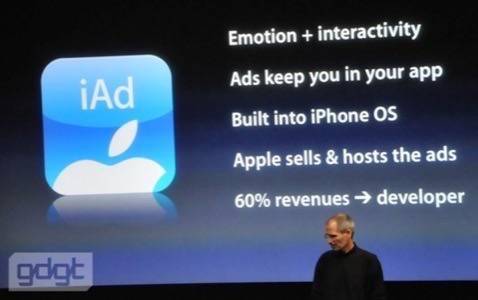At the most recent Apple keynote, Steve Jobs announced Apple’s upcoming advertising platform called iAd. Included as a part of the OS 4.0 update, the mobile operating system upgrade due out for iPhone this summer and iPad later this fall, the iAd system aims, in its very Apple-ly way, to make mobile advertisements “delightful,” meaning ads worth clicking on, engaging with and viewing.

What Jobs didn’t mention, though, is how Apple plans to give iAd its head start: by kicking out the competing analytics and advertising platforms now thriving in nearly every iPhone app today.
Or so it seems.
Developer Reports App Store Rejection Due to Analytics Inclusion
Last week, technology news blog VentureBeat caught wind of a story where Apple had rejected an iPhone application because it, according to the email sent to the developer, “is not appropriate for applications to gather user analytics.”
Not appropriate, you may ask? Since when?
Apparently since Apple released its updated iPhone Developer Agreement. Alongside the SDK 4 beta, made available shortly after the announcement in early April, the developer contract was updated, too.

Specifically, the clause in question, section 3.3.9, reads, in part (more here):
Notwithstanding anything else in this Agreement, Device Data may not be provided or disclosed to a third party without Apple’s prior written consent. Accordingly, the use of third party software in Your Application to collect and send Device Data to a third party for processing or analysis is expressly prohibited.
To date, the changes detailed in this clause have been overshadowed by the one preceding it; in Section 3.3.1, Apple banned the use of cross-compiler tools for building iPhone applications, like the one Adobe was just about to ship, for example.
But in the long run, it’s Section 3.3.9 that may have more impact on the industry as a whole.
“FEAR”
You may have not heard too much about this change because no one actually knows what’s going on thanks to Apple’s par-for-the-course policy of refusing to clarify its meaning. Plus, the companies that may be the most heavily affected by an analytics ban – services like Flurry, MediaLets, Motally and Localytics, to name a few – don’t want to talk about it. On record that is.
But after a dozen or so phone calls and emails, we’re starting to see a picture forming and it can be summed up in one word: FEAR.

“Nobody wants to be the canary in the coal mine,” one source told us, referring to the radio silence we’re getting from these companies when you would have otherwise expected to hear outcry, or perhaps even anti-competitive claims. Some companies, off-record, say they are afraid to complain. If they do, they could be the next to be banned.
Another source reported that a number of their company’s clients weren’t submitting updates to the iTunes Application Store because they were worried that the updates, with the analytics included of course, would be rejected. Instead, the clients are leaving their older applications in place since it doesn’t appear that Apple is going back through all the current apps and booting out those that already include analytics within them. “Maybe the older apps are grandfathered in?” they wondered aloud.
The fact that no one knows, not even the big-name, big-box retailer that sits at the top of the latter’s client list, is a testament to how Apple likes to do business. Here’s the agreement, read it, sign it… and that’s the extent of the communication.
As to those who did manage to get someone from Apple to talk about it? The answer was simply: “Read the agreement.”
But if Apple holds true to what’s written there, it sounds like it could spell doom for mobile analytics and ad firms, especially the small-time players beloved by independent developers.
iAd, Anti-Competitive?
What no one will say – again, on record, that is – is that the changes have a whiff of anti-competitive behavior to them. The issue at hand: Apple is preparing to launch iAd, an advertising platform based on the newly acquired Quattro Wireless technology, a company that was the second choice for Apple after the Admob deal fell through.
“We tried to buy AdMob, but Google snatched them up because they didn’t want us to have them,” Steve Jobs said during the April keynote. “So we bought another smaller company, Quattro. But we’re babes in the woods.”
But these “babes” are toting means guns, some say. A couple companies see the language in section 3.3.9 as a direct shot at AdMob in the same way that the changes in 3.3.1 were a shot at Adobe. That is, instead of allowing Google to get its mobile advertisements onto the iPhone, Apple can keep them out via the new analytics and ad ban.
Whether or not that’s the case is certainly up for debate. But considering that the Google/AdMob deal is still being researched by U.S. antitrust enforcers, regulators are aware of the issue. Word has it that Google even pointed it out to the FTC, just in case.
A Second Opinion: Privacy Concerns
Others, however, say these changes aren’t really about analytics, ads and anti-competitive behavior as much as they are about privacy concerns. In speaking with Alan Chapell, chairman of the Mobile Marketing Association Privacy Committee and whose firm advises companies on privacy and data strategy, the changes to Apple’s agreement have to do more with consumer privacy than anything else.

With language that refers to “geo-location” and targeted advertising, a good bit of Section 3.3.9 is about how location-based applications should behave. With the rise of location-based services and location-based social tools like Loopt, Foursquare, Gowalla, and others, privacy is at the forefront of everyone’s minds these days. (Including ours.) There are no standards for location-based data yet, Chapell explains – no rules about how such data should be used, retained, shared and so on.
In addition, Apple is under heavy pressure from regulators to protect the privacy of its customers. And if the third-party analytics providers do something that comprises that privacy, it will be Apple that gets in trouble.
“This debate is about privacy and innovation,” Chapell notes, “and finding a balance between the two.”
Unfortunately, even if Apple chooses never to enforce the new rules, explains Chapell, the changes will have an indirect impact on innovation in this area. The next round of ad networks, analytics providers and other in-app data-sharing tools will be less likely to be funded.
Not Just Funding at Risk…
These changes won’t just affect the funding of services like those noted above, though, they could affect how services are developed for the iPhone. Take for example Xtify, a location-triggered geo-messaging system now available for Android (previous coverage). The company’s VP of business development, Joshua Schmiffman, says they’re still figuring out what this all means, but they will have some location-triggered functionality for the iPhone. “We are going to try,” he says, “but it may not be exactly ‘real time.'”
That is, if it ever comes to the iPhone at all.
Backup Plans: 1st-Party Analytics, “Trust in Apple”
As for Localytics, a small-time analytics provider for mobile apps, the decision is to focus more on the company’s soon-to-launch enterprise solution. The upcoming offering will allow application publishers to directly collect and process app analytics data without going through a 3rd party. Brian Suthoff, Localytics’ VP of marketing, calls this “1st-party analytics.”
Ashish Chordia, CEO and Founder of AppDiscover, an iPhone application development and analytics company, is also generally unconcerned with the changes. “While the wording of the terms in section 3.3.9 is quite strict, Apple will not enforce this specific term,” he writes in an email. “Enforcing this term would mean rejecting a huge number of apps. Moreover these analytic services are very important for a healthy market for free / ad-supported apps, so that there can be transparency behind the CPM / CPA pricing.”
On a call, he tells us that several of the company’s analytics-enabled apps have made it into the App Store since the agreement was released. Essentially, Chordia believes that Apple will selectively enforce this restriction, but it won’t affect applications like his.

“Looking Forward to More Insights”
Outside of public statements like those we received from Flurry and Motally (the latter: “We’ve reached out to Apple for clarification and are looking forward for more insights into the policy.”), the backchannel whispers are that this whole iAd thing is worrisome right now, but not deadly… at least, not yet.
But when reading through the initial hands-on reviews of iAd, like the recent one from ad agency Hill Holiday, which spoke of iAd’s impressive granularity, there are concerns that Apple wants to now dominate where the third-party analytics providers once did.
In the meantime, you can count us among those who are also “looking forward to more insights” from Apple. But we’re not holding our breath.
Image credits: Toy Story iAd, Hill Holiday; Steve Jobs, gdgt





















